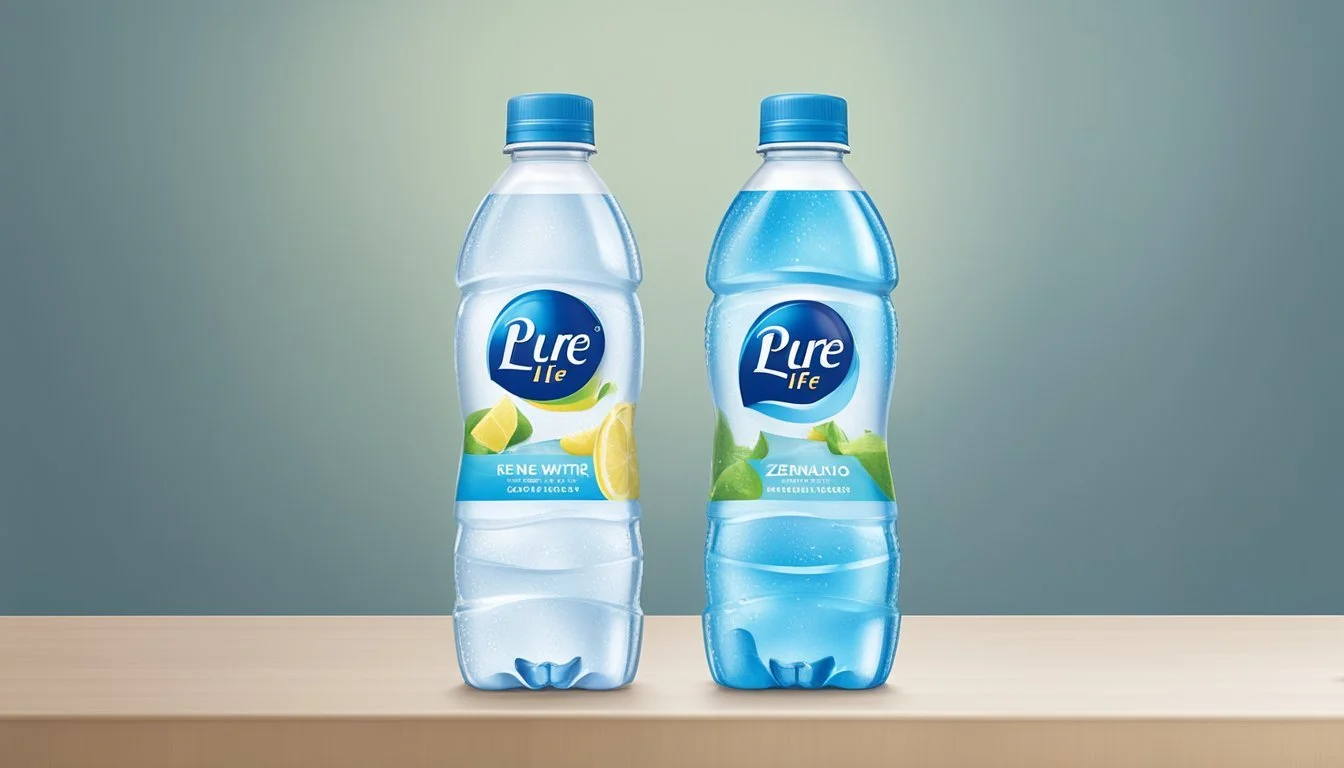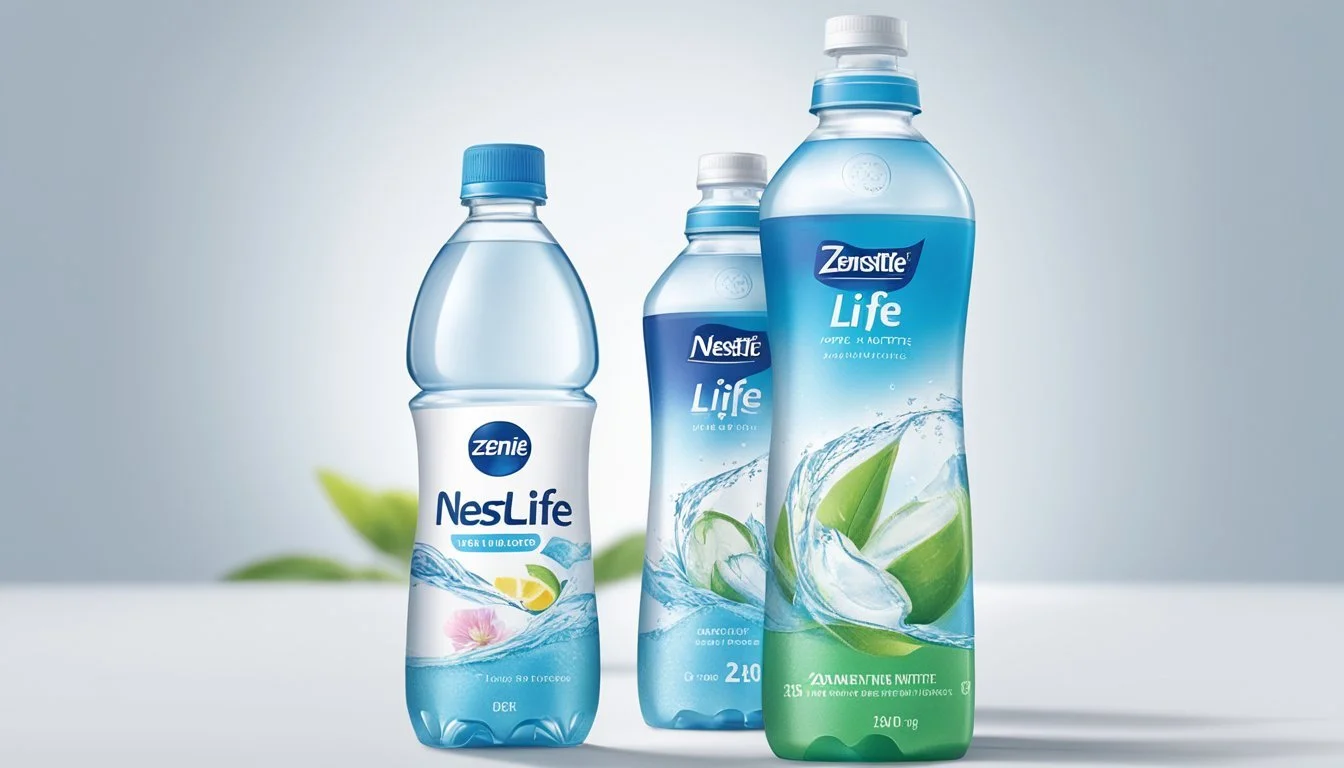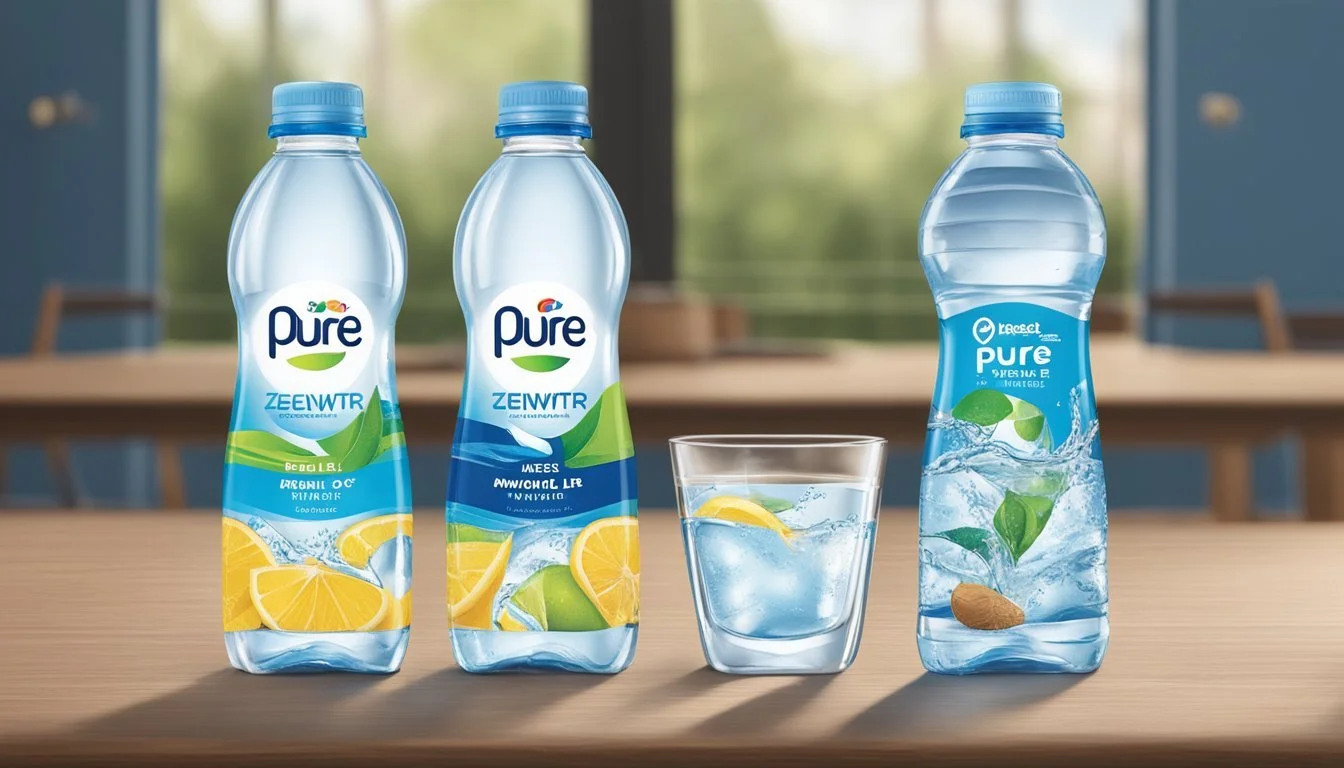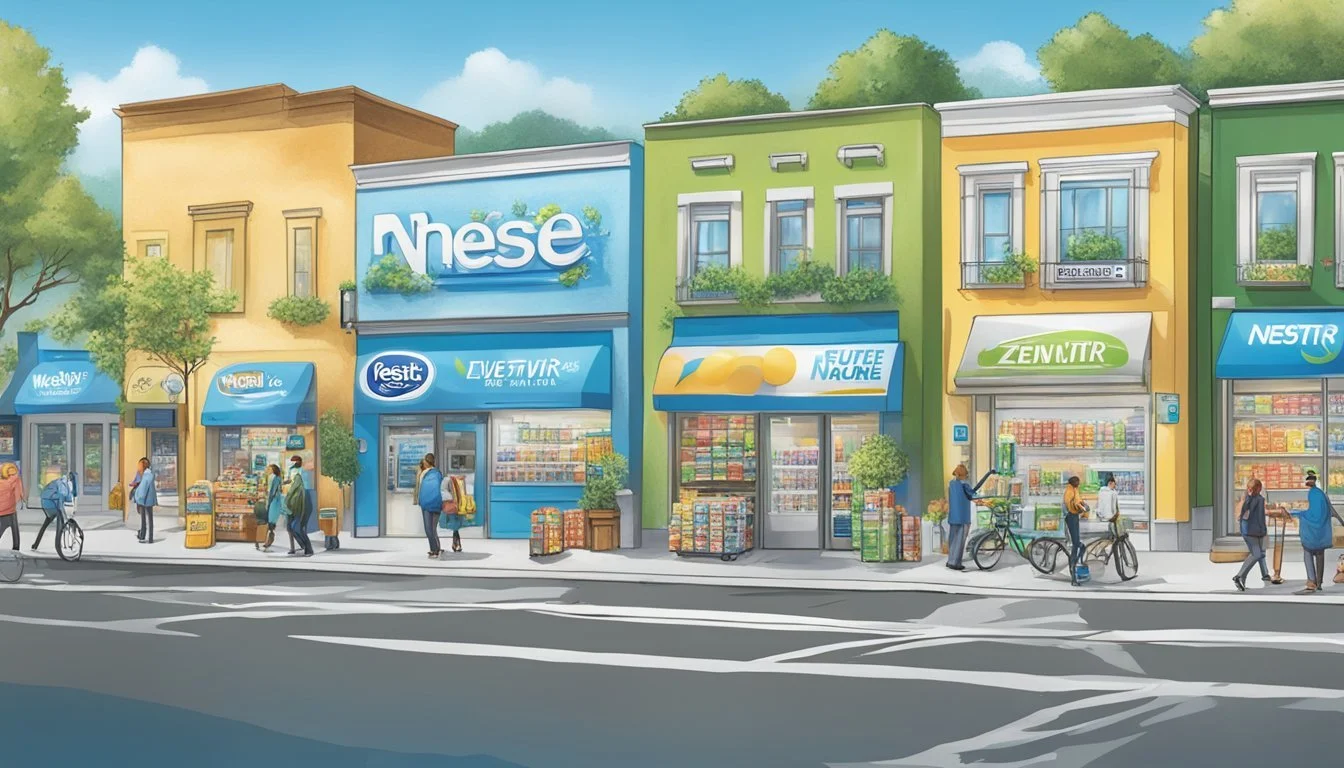Nestlé Pure Life vs. Zenwtr
Ultimate Bottled Water Showdown
In the ongoing debate of Nestlé Pure Life vs. ZenWTR, consumers seek not just hydration but also overall health benefits and environmental impact. Nestlé Pure Life, a well-known name in the bottled water industry, promises purity and reliability. On the other hand, ZenWTR appeals with its commitment to sustainability and alkaline properties, boasting a pH of 9.5 for those inclined towards health-conscious choices.
When comparing these two brands, ZenWTR stands out with its dual promise of personal health benefits and environmental contribution. Unlike the mainstream appeal of Nestlé Pure Life, ZenWTR markets itself as a symbol of conscious consumerism, actively supporting ocean cleanup initiatives.
This comparison reveals a clear distinction: those prioritizing traditional brand reliability may lean toward Nestlé Pure Life, while individuals seeking both health and sustainability are likely to be drawn to ZenWTR. Dive deeper into the nuanced differences and make an informed choice based on what matters most to your lifestyle and values.
Understanding Bottled Water
Bottled water comes in various forms, each with unique characteristics regarding its sources, purification methods, and health benefits. It is important to distinguish between these types and understand how they impact both personal health and the environment.
Types and Sources of Bottled Water
Bottled waters are commonly derived from different sources. Spring water is collected from natural springs and maintains its mineral content. Purified water, on the other hand, usually originates as tap water but undergoes extensive purification processes to remove contaminants.
Mineral water contains naturally occurring minerals and electrolytes, often sourced from underground springs. Alkaline water typically has a higher pH level, which proponents believe can balance body's acidity. The source defines a bottled water's taste, mineral content, and potential health benefits.
Filtration and Purification Techniques
The filtration process varies between bottled water brands. Reverse osmosis is a common technique where water is forced through a semipermeable membrane, removing impurities and minerals.
Distillation involves boiling water to produce steam, which is then condensed back into liquid, leaving contaminants behind. Other methods include ultraviolet light treatment, which disinfects water by killing bacteria and viruses, and carbon filtration, which can remove chlorine, organic compounds, and certain metals.
Health Implications and Hydration Benefits
Bottled water can contribute to daily hydration needs and may offer specific health benefits. Minerals and electrolytes present in some bottled waters can help maintain body fluid balance, muscle function, and nerve function.
Alkaline water with a higher pH level might neutralize acid in the bloodstream, although scientific evidence is mixed. Consuming bottled water can ensure a source of clean, purified water free from potential tap water contaminants, which is crucial for those in areas with poor water quality.
Whether prioritizing electrolyte replenishment or seeking a pure hydration option, understanding these elements can guide better choices in bottled water consumption.
Analyzing Nestlé Pure Life
Nestlé Pure Life, a brand under the giant Nestlé umbrella, stands out in the bottled water market with its focus on stringent filtration processes and quality checks. It's also known for its efforts in sustainability and maintaining a clean, crisp taste profile with added minerals.
Sourcing and Filtration Techniques
Nestlé Pure Life sources its water from various protected springs and municipal supplies. The brand emphasizes a multi-stage filtration process, involving microfiltration, reverse osmosis, and carbon filtration. These steps help remove impurities and ensure cleanliness. Quality checks are stringent, with multiple phases to verify water purity. This process results in water that is consistently clean and safe for consumption.
Environmental and Sustainability Practices
Nestlé Pure Life has made significant strides in sustainability, particularly in packaging. They use bottles made from recycled plastic and are committed to reducing their environmental footprint. Initiatives to source water responsibly and decrease plastic waste are crucial components of their environmental strategy. This focus on sustainability aligns with broader industry trends to address plastic pollution and resource management.
Flavor Profile and Mineral Content
Nestlé Pure Life boasts a clean and crisp taste, which is partially attributed to the minerals added back into the water after filtration. These added minerals, such as calcium and magnesium, not only enhance the taste but also contribute to the overall mineral content and hydration benefits. The water’s taste profile is mild, making it a popular choice for individuals seeking a refreshing and neutral-tasting bottled water option.
Examining ZenWTR
ZenWTR stands out for its emphasis on alkaline purity, eco-friendly packaging, and an enhanced taste profile with added electrolytes. These aspects make this brand particularly appealing to health-conscious and environmentally aware consumers.
Purification Process and Hydro-7 Filtration
ZenWTR utilizes a sophisticated Hydro-7 filtration process to ensure the highest level of water purity. This advanced system effectively removes impurities and contaminants, resulting in clean, refreshing water.
The Hydro-7 process involves multiple stages that purify the water without using chemicals. The filtered water achieves a stable pH level of 9.5, which is considered alkaline. This level of purification and alkaline balance makes ZenWTR a preferred choice for those looking for pure and balanced hydration.
Commitment to Recycling and Plastic Use
ZenWTR is committed to sustainability, using 100% recycled ocean-bound plastic for its bottles. This initiative supports recycling efforts and reduces ocean pollution, aligning with the company's mission to protect marine life and promote environmental responsibility.
By repurposing plastic that would otherwise end up in the ocean, ZenWTR helps mitigate the plastic pollution crisis. Their packaging reflects this dedication, making it an attractive option for eco-conscious consumers. The brand's efforts support broader environmental goals while providing a practical benefit.
Taste and Electrolyte Enhancement
ZenWTR boasts an alkaline pH of 9.5 and an enhanced taste profile, achieved through the addition of essential electrolytes. These electrolytes, such as calcium, magnesium, and potassium, not only improve the flavor but also offer health benefits.
Athletes and active individuals often prefer ZenWTR for its electrolyte content, which aids in maintaining hydration and supporting muscle function. The crisp, clean taste of ZenWTR, combined with its health benefits, contributes to its popularity among consumers seeking high-quality bottled water.
Comparing Quality and Taste
Nestlé Pure Life and ZenWTR are both well-regarded bottled water brands. They each offer unique attributes such as quality standards and specific taste profiles that cater to diverse consumer preferences.
Quality Standards and Certifications
Nestlé Pure Life adheres to stringent FDA regulations and internal quality checks to ensure its water meets safety standards. The brand uses safe extraction methods and undergoes multiple steps of purification. Additionally, Nestlé Pure Life has received several certifications that affirm its commitment to quality and water purity.
ZenWTR, recognized for its environmentally friendly approach, maintains high quality standards through sustainable practices. This water boasts a high pH level of 9.5, making it alkaline. The brand's commitment to using recycled plastic bottles adds another layer of quality certification, appealing to environmentally conscious consumers. Both brands prioritize water quality but do so through different approaches.
Taste Comparison and Consumer Preferences
Taste is a significant factor for many bottled water consumers. Nestlé Pure Life is often praised for its clean, crisp taste. This is attributed to its extensive purification process, which removes impurities that may affect water taste.
ZenWTR’s high pH level gives it a unique, smooth flavor that many consumers find appealing. Some prefer its alkaline nature for health reasons, believing it offers better hydration. Consumer preferences vary, with some favoring the distinct taste of ZenWTR’s alkaline water, while others stick to the familiar, reliable taste of Pure Life. Both brands cater to different palates, offering quality options that meet the demands of a diverse consumer base.
Health and Nutritional Aspects
Nestlé Pure Life and ZenWTR offer distinctive health and nutritional benefits. The comparison includes analyzing their mineral content and their effects on hydration and pH balance.
Comparison of Mineral Content
Nestlé Pure Life:
Known for adding minerals for taste, including calcium, magnesium, and potassium chloride.
Aimed at providing basic mineral supplementation, beneficial for overall health.
ZenWTR:
Marketed as alkaline water with a pH of 9.5.
Contains naturally occurring potassium, calcium, and magnesium.
The minerals in ZenWTR are sourced to increase hydration and potentially offer anti-acidic benefits.
ZenWTR’s unique mineral composition and higher pH differentiate it from Nestlé Pure Life, which emphasizes a balanced mineral profile for taste and health.
Hydration and pH Balance
Nestlé Pure Life:
The added minerals support hydration but don't significantly alter body pH.
Known for reliability in taste and hydrating properties.
ZenWTR:
With a pH of 9.5, it is considered alkaline water, which can help balance body pH.
Marketed for its potential to neutralize acidity, promoting better hydration and overall health.
Individuals who prefer alkaline water for its potential health benefits may favor ZenWTR, while those looking for a mineral-rich option might choose Nestlé Pure Life for its balanced hydration properties.
Environmental Impact and Sustainability
This section discusses the environmental impact of Nestlé Pure Life and ZenWTR, focusing on packaging materials, waste reduction, and water source preservation.
Packaging Materials and Waste Reduction
Nestlé Pure Life uses plastic bottles that have raised concerns regarding environmental waste. Recycling efforts are in place, but a significant amount of plastic still ends up in landfills. The company claims to use a certain percentage of recycled plastic in their bottles, aiming to improve sustainability.
ZenWTR bottles are made entirely from recycled ocean-bound plastic. This focus on recycled materials significantly reduces plastic waste and promotes environmental sustainability. The use of 100% recycled plastic for packaging highlights ZenWTR's commitment to reducing environmental impact and waste reduction.
Water Source Preservation and Conservation Efforts
Nestlé Pure Life sources its water through a multi-step filtration process, focusing on purification and consistency. The company emphasizes adhering to strict standards for safe drinking water. However, Nestlé has faced criticism regarding water extraction practices and the strain on natural springs.
ZenWTR, while focusing on sustainable packaging, also ensures water source preservation through balanced extraction practices. They emphasize the responsible use of natural springs and other water sources to maintain ecological balance. The company's efforts in conservation contribute to its broader sustainability goals.
Consumer Convenience and Accessibility
When choosing between Nestlé Pure Life and ZenWTR, consumers will likely consider factors such as availability and packaging options, which can significantly affect their purchasing decisions.
Availability and Packaging Options
Nestlé Pure Life is widely available across various retail outlets, including supermarkets, convenience stores, and online platforms. It offers multiple packaging sizes, ranging from small single-serve bottles to large multi-pack cases, providing flexibility for various needs.
ZenWTR, while supporting marine life cleanup initiatives, is primarily available in specialty stores and online. It offers fewer packaging options but emphasizes environmentally friendly packaging. Its bottles are made from 100% recycled ocean-bound plastic, appealing to environmentally conscious consumers.
Both brands cater to different consumer preferences, with Nestlé Pure Life focusing on widespread availability and varied packaging, and ZenWTR prioritizing sustainability in its packaging choices.
Final Assessment
Nestlé Pure Life offers widespread availability and affordability. ZenWTR, on the other hand, emphasizes sustainability with its use of 100% recycled ocean-bound plastic bottles.
Quality and Sourcing
Nestlé Pure Life: Sources from various locations, includes purification processes, and ensures consistency.
ZenWTR: Sources alkaline water, aiming for a pH of 9.5, promoting both physical and environmental benefits.
Sustainability
Nestlé Pure Life: Committed to recyclable packaging but faces criticism regarding environmental practices.
ZenWTR: Actively supports ocean cleanup initiatives and uses recycled materials, enhancing its eco-friendly image.
Taste
Nestlé Pure Life: Often considered average in taste, appealing to a broad market.
ZenWTR: Alkaline water may offer a different taste profile, receiving positive feedback for its clean and crisp flavor.
Health Benefits
Nestlé Pure Life: Offers purified water free from contaminants, maintaining hydration.
ZenWTR: Alkaline water with a higher pH level, marketed for potential health benefits including improved hydration and balance.
Aspect Nestlé Pure Life ZenWTR Quality Purified, consistent taste Alkaline, pH 9.5 Sustainability Recyclable packaging Recycled ocean-bound plastic Taste Average Positive feedback Health Benefits Hydration Potential health benefits
ZenWTR sets itself apart through sustainability and health benefits. Nestlé Pure Life remains a reliable choice for those seeking consistent quality and affordability.
More About Nestlé Pure Life
Acqua Panna vs Nestle Pure Life: Which Bottled Water is Better?
Aquafina vs Nestle Pure Life: Which Bottled Water is Better?
Arrowhead vs Nestle Pure Life: Which Bottled Water is Better?
Boxed Water vs Nestle Pure Life: Which Bottled Water is Better?
Core Hydration vs Nestle Pure Life: Which Bottled Water is Better?
Deer Park vs Nestle Pure Life: Which Bottled Water is Better?
Essentia vs Nestle Pure Life: Which Bottled Water is Better?
Ice Mountain vs Nestle Pure Life: Which Bottled Water is Better?
Icelandic Glacial vs Nestle Pure Life: Which Bottled Water is Better?
Just Water vs Nestle Pure Life: Which Bottled Water is Better?
Mountain Valley Spring Water vs Nestle Pure Life: Which Bottled Water is Better?
Nestle Pure Life vs 1907water: Which Bottled Water is Better?
Nestle Pure Life vs 7-Select: Which Bottled Water is Better?
Nestle Pure Life vs Alkaline88: Which Bottled Water is Better?
Nestle Pure Life vs Antipodes: Which Bottled Water is Better?
Nestle Pure Life vs Aqua Carpatica: Which Bottled Water is Better?
Nestle Pure Life vs Big Chill: Which Bottled Water is Better?
Nestle Pure Life vs BodyArmor: Which Bottled Water is Better?
Nestle Pure Life vs Cascade Mountain: Which Bottled Water is Better?
Nestle Pure Life vs Castle Rock: Which Bottled Water is Better?
Nestle Pure Life vs CBD Living: Which Bottled Water is Better?
Nestle Pure Life vs Crystal Geyser: Which Bottled Water is Better?
Nestle Pure Life vs Crystal Lake: Which Bottled Water is Better?
Nestle Pure Life vs Essence pH10: Which Bottled Water is Better?
Nestle Pure Life vs Hawaii Volcanic: Which Bottled Water is Better?
Nestle Pure Life vs Hawaiian Springs: Which Bottled Water is Better?
Nestle Pure Life vs Kirkland Signature: Which Bottled Water is Better?
Nestle Pure Life vs Liquid Death: Which Bottled Water is Better?
Nestle Pure Life vs Mananalu: Which Bottled Water is Better?
Nestle Pure Life vs Open Water: Which Bottled Water is Better?
Nestle Pure Life vs Poland Spring: Which Bottled Water is Better?
Nestle Pure Life vs Proud Source: Which Bottled Water is Better?
Nestle Pure Life vs Pure Life: Which Bottled Water is Better?
Nestle Pure Life vs Purely Sedona: Which Bottled Water is Better?
Nestle Pure Life vs Refreshe: Which Bottled Water is Better?
Nestle Pure Life vs Richard's Rainwater: Which Bottled Water is Better?
Nestle Pure Life vs San Pellegrino: Which Bottled Water is Better?
Nestle Pure Life vs Simple Truth: Which Bottled Water is Better?
Nestle Pure Life vs Smartwater: Which Bottled Water is Better?
Nestle Pure Life vs Solan de Cabras: Which Bottled Water is Better?
Nestle Pure Life vs Talking Rain AQA: Which Bottled Water is Better?
Nestle Pure Life vs The Well: Which Bottled Water is Better?
Nestle Pure Life vs Topo Chico: Which Bottled Water is Better?
Nestle Pure Life vs Tru Alka: Which Bottled Water is Better?
Nestle Pure Life vs Weird Water: Which Bottled Water is Better?
Nestle Pure Life vs Whole Foods 365: Which Bottled Water is Better?
Nestle Pure Life vs Whole Foods Italian Still Mineral water: Which Bottled Water is Better?
Nestle Pure Life vs Zephyrhills: Which Bottled Water is Better?







